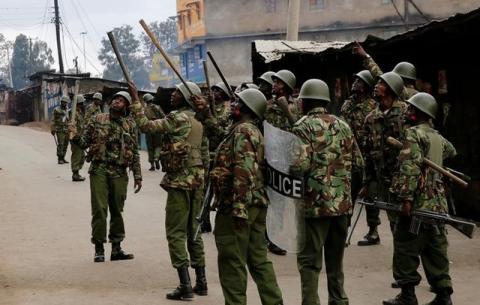Advertisement
Kenyan police fire tear gas after women attacked at election meeting
KISUMU, Kenya (Reuters) - Kenyan police in the western city of Kisumu fired tear gas and bullets in the air on Wednesday to disperse young men who broke into a hotel and beat women attending an election meeting, an officer said.
Kenya held presidential, legislative and local elections on Aug. 8, but three weeks later the Supreme Court nullified the presidential result, citing irregularities in the tallying process. A re-run is scheduled for Oct. 17.
Although the ruling ushered in a period of uncertainty, many hope it will restore some faith in Kenya's tarnished institutions, reducing the long-term likelihood of political violence.
On Wednesday, a Christian women's organization was holding a meeting related to the election re-run when the men broke into the hotel where they were meeting, said Joseph Keitany of the Administration Police in Kisumu County. The region is a stronghold of opposition leader Raila Odinga.
"We deployed police and they fired tear gas and bullets in the air and chased the group of young boys away," he told Reuters. "The youth started beating women and they stole their laptops and money" before police arrived.
A Reuters witness said the men smashed windows and broke chairs. Another witness said young men attacked participants using the broken chairs.
"I was making my presentation when the youths came in," said pastor Alice Atieno. "They started interrogating us and beating us on claims that we were buying IDs."
Keitany said he believed the men stormed the hotel because of rumours circulating on WhatsApp that the women’s meeting was intended to plan the renting of voter identification cards, a rigging tactic alleged by the opposition ahead of last month's election, where online hoaxes and fake stories were alleged from all sides.
Participants in the meeting denied that was the purpose and said they were meeting to see how to encourage peaceful voting.
A Reuters witness said he saw a Red Cross ambulance taking three women to hospital.
In 2007, a disputed presidential vote led to protests and ethnic violence that killed 1,200 people. Following the August election, human rights organisations reported at least 28 deaths, mostly linked to police. But the protests were quelled when the opposition decided to take its complaints to court.
Kenya's vocal civil society organisations have been working hard to plan monitoring and advocacy around the new vote.
The east African nation is the region's richest economy and a stable Western ally in a region roiled by conflict.
(Reporting By Kevine Omollo in Kisumu and Maggie Fick in Nairobi; Writing by Maggie Fick; Editing by Janet Lawrence)



















Add new comment